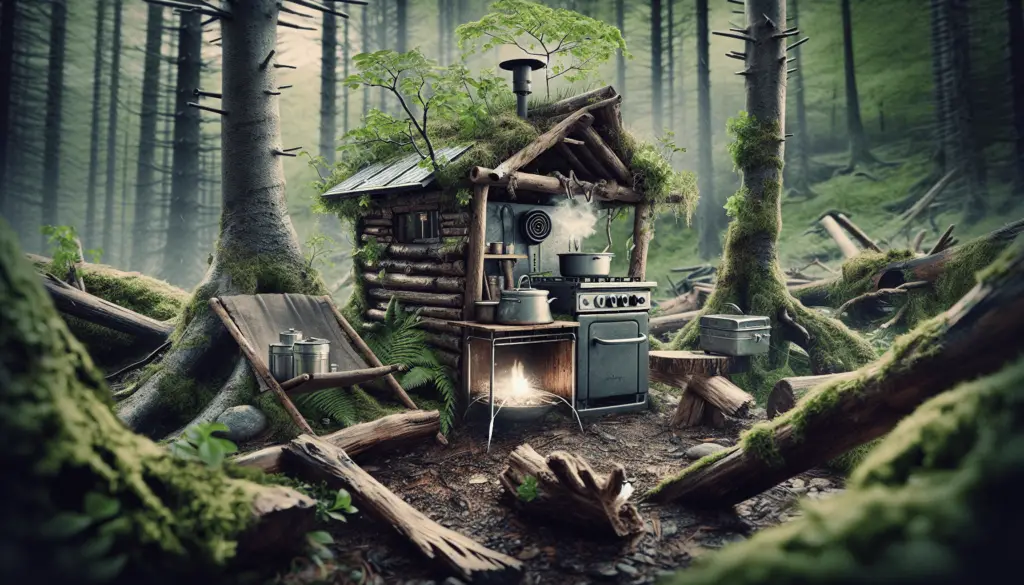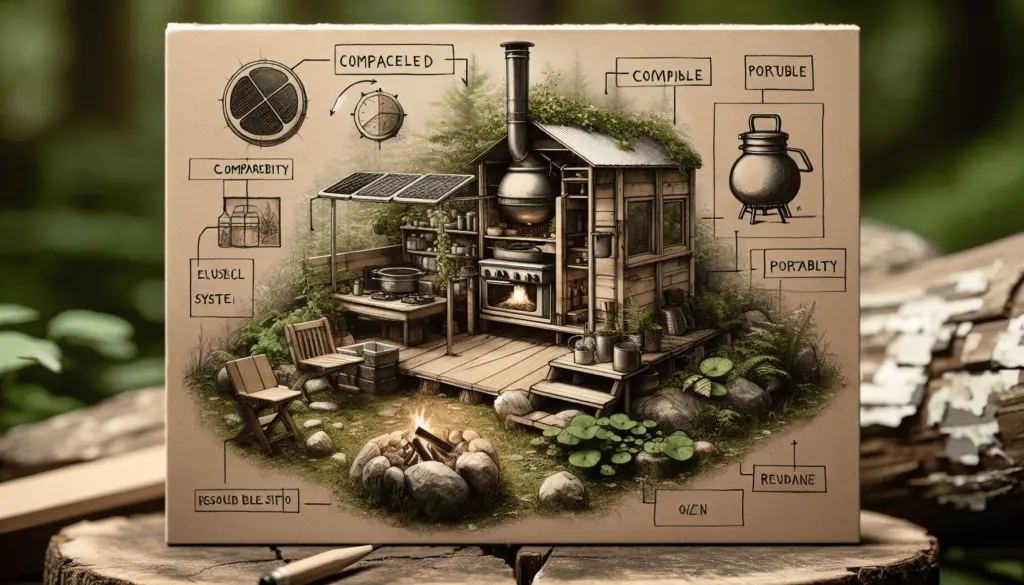Are you tired of relying on traditional cooking methods when you’re off the grid? In this article, you’ll learn how to build an efficient off-grid cooking system that will revolutionize your outdoor cooking experience. From DIY rocket stoves to solar powered ovens, we’ll explore different methods to help you cook delicious meals no matter where your adventures take you. Say goodbye to lugging around heavy propane tanks and hello to sustainable cooking solutions that are both effective and environmentally friendly. Let’s get cooking! Have you ever thought about setting up an efficient cooking system off the grid? Whether you’re planning a camping trip, living in a remote area, or simply looking to reduce your reliance on traditional energy sources, an off-grid cooking system can be a game-changer. In this article, we will guide you through the process of building an efficient off-grid cooking system that suits your needs and preferences. Let’s get started!

Choosing the Right Cooking Fuel
When it comes to setting up an off-grid cooking system, the first and most crucial decision is choosing the right cooking fuel. There are several options to consider, each with its pros and cons. Let’s take a closer look:
| Fuel Type | Pros | Cons |
|---|---|---|
| Propane | Clean-burning, efficient | Needs to be refilled or replaced |
| Wood | Readily available, provides heat | Produces smoke and ash |
| Charcoal | Easy to store and transport | Higher cost compared to other fuels |
| Solar | Renewable, no fuel required | Requires adequate sunlight |
| Biofuels | Environmentally friendly, renewable | Limited availability in certain areas |
Each fuel type has its advantages and limitations, so it’s essential to consider your specific circumstances before making a decision. For example, if you have ample access to wood and enjoy the rustic charm of cooking over an open fire, a wood-burning stove may be the ideal choice for you. On the other hand, if you prioritize convenience and cleanliness, a propane stove could be a better fit.
Selecting the Right Cooking Appliance
Once you’ve chosen the cooking fuel that best suits your needs, the next step is selecting the right cooking appliance. There are several options available, ranging from portable camp stoves to full-fledged outdoor kitchens. Consider the following factors when choosing a cooking appliance for your off-grid setup:
- Portability: Are you planning to use the cooking appliance for camping trips, or will it be a permanent fixture in your off-grid kitchen?
- Cooking Capacity: How many people will you be cooking for regularly? Do you need multiple burners or a larger cooking surface?
- Fuel Compatibility: Ensure that the cooking appliance is compatible with the fuel type you’ve chosen. For example, not all stoves are designed to work with wood or charcoal.
- Durability: Look for cooking appliances made from high-quality materials that can withstand outdoor conditions and frequent use.
Whether you opt for a compact camping stove for occasional use or invest in a robust outdoor cooking range for daily meals, choosing the right cooking appliance is essential for building an efficient off-grid cooking system that meets your requirements.
Portable Camp Stoves
Portable camp stoves are a popular choice for outdoor enthusiasts, campers, and off-grid living enthusiasts. These lightweight and compact stoves are designed for portability and ease of use, making them ideal for cooking on the go. Most portable camp stoves run on propane or butane fuel canisters, providing a quick and convenient way to prepare meals outdoors.
If you’re looking for a versatile and user-friendly cooking appliance for your off-grid setup, a portable camp stove may be the perfect solution. These stoves come in various sizes and designs, ranging from single-burner models for solo adventurers to dual-burner stoves for family camping trips. When selecting a portable camp stove, consider factors such as fuel efficiency, ease of maintenance, and cooking performance.
Outdoor Cooking Ranges
For off-grid homesteads and long-term living arrangements, outdoor cooking ranges offer a more permanent and robust solution. These freestanding cooking appliances typically feature multiple burners, ovens, grills, and other cooking components, providing a comprehensive cooking experience similar to a traditional indoor kitchen.
Outdoor cooking ranges can be powered by propane, natural gas, or wood, depending on your preference and availability of fuel sources. When selecting an outdoor cooking range for your off-grid setup, consider factors such as cooking capacity, fuel efficiency, durability, and ease of installation. Investing in a high-quality outdoor cooking range can transform your off-grid kitchen into a functional and efficient cooking space for everyday use.
Setting Up a Functional Cooking Area
Once you’ve chosen the right cooking fuel and appliance for your off-grid setup, it’s time to create a functional cooking area that enhances your cooking experience. Whether you’re setting up a temporary outdoor kitchen for a camping trip or designing a permanent cooking space for off-grid living, consider the following tips to optimize your cooking area:
-
Shelter: Provide adequate shelter to protect your cooking area from the elements, such as rain, wind, and sun exposure. A simple canopy, tarp, or outdoor shelter can make a significant difference in your cooking comfort and efficiency.
-
Work Surface: Create a sturdy and stable work surface for food preparation and cooking. A foldable table, countertop, or outdoor kitchen island can serve as a convenient workspace for cutting, chopping, and assembling ingredients.
-
Storage: Organize your cooking supplies, utensils, cookware, and fuel sources in an easily accessible storage system. Consider using bins, crates, shelves, or cabinets to keep your cooking area tidy and well-equipped.
-
Cooking Equipment: Arrange your cooking equipment, such as stoves, grills, and ovens, in a functional layout that maximizes efficiency and convenience. Keep essential tools and accessories within reach for seamless meal preparation.
-
Cleaning Station: Set up a designated cleaning station with a sink, water source, and cleaning supplies for washing dishes, utensils, and cookware. Proper sanitation is essential for maintaining a hygienic cooking area and preventing foodborne illnesses.
By following these tips and creating a well-organized and functional cooking area, you can streamline your cooking process and make the most of your off-grid cooking system.
Outdoor Kitchen Design Ideas
If you’re looking to elevate your off-grid cooking experience, consider incorporating the following design ideas into your outdoor kitchen setup:
-
Modular Kitchen Units: Invest in modular kitchen units that offer flexibility and customization options for your outdoor cooking space. These units can include cabinets, countertops, sinks, and storage compartments that are designed to withstand outdoor conditions.
-
Outdoor Pizza Oven: Add a wood-fired pizza oven to your outdoor kitchen for a unique cooking experience and delicious homemade pizzas. Wood-fired ovens can reach high temperatures and produce crispy, flavorful pizzas that rival those from traditional pizzerias.
-
Barbecue Grill: Install a barbecue grill or smoker for outdoor grilling and barbecue sessions. Whether you enjoy grilling steaks, burgers, kebabs, or smoking meats, a quality grill can elevate your outdoor cooking game and impress your guests.
-
Outdoor Dining Area: Create a cozy outdoor dining area with a picnic table, chairs, and lighting to enjoy meals al fresco. Enhance the ambiance with string lights, lanterns, or a fire pit for a rustic and inviting dining experience.
By incorporating these design ideas into your outdoor kitchen setup, you can transform your off-grid cooking system into a functional, stylish, and enjoyable space for cooking, dining, and entertaining.
Maintaining and Troubleshooting Your Off-Grid Cooking System
To ensure the efficiency and longevity of your off-grid cooking system, proper maintenance and troubleshooting are essential. By following these tips and guidelines, you can address common issues, prevent potential problems, and maximize the performance of your cooking appliance:
-
Regular Cleaning: Keep your cooking appliance clean and free of debris, grease, and food residues that can affect its performance and safety. Follow the manufacturer’s cleaning instructions and schedule routine maintenance to prevent clogs, leaks, and malfunctions.
-
Inspecting Fuel Sources: Check your fuel sources, such as propane tanks, wood supplies, or charcoal bags, for leaks, damage, or contamination. Store fuel sources in a safe and dry location away from heat, flames, or direct sunlight to ensure their integrity and longevity.
-
Monitoring Gas Pressure: If you’re using a propane stove or grill, monitor the gas pressure regularly to ensure optimal performance and safety. Use a pressure gauge or indicator to check for any fluctuations, leaks, or blockages that may affect the fuel flow.
-
Replacing Parts: Replace worn-out or damaged parts of your cooking appliance, such as burners, regulators, hoses, or seals, as needed. Use genuine replacement parts recommended by the manufacturer to maintain the safety and effectiveness of your off-grid cooking system.
-
Handling Emergencies: In case of emergencies or malfunctions, know how to safely shut off the fuel supply, extinguish flames, and evacuate the cooking area. Keep a fire extinguisher, first aid kit, and emergency contact information on hand for quick response and assistance.
By staying proactive, observant, and prepared, you can troubleshoot common issues, maintain your off-grid cooking system effectively, and enjoy a seamless and hassle-free cooking experience in any outdoor or off-grid setting.
Common Troubleshooting Issues
If you encounter any of the following issues with your off-grid cooking system, try these troubleshooting tips to address them promptly:
-
Low Flame or Heat Output: Check the gas pressure, regulator, and burner ports for blockages, leaks, or malfunctions. Clean or repair any components that may be causing low flame or heat output for improved cooking performance.
-
Uneven Cooking or Hotspots: Adjust the placement of pots, pans, or grates on the cooking appliance to ensure even heat distribution and cooking consistency. Use heat diffusers, temperature gauges, or rotating mechanisms to minimize hotspots and improve cooking results.
-
Smoke Emissions or Soot Buildup: Monitor the fuel-to-air ratio, ventilation, and combustion process to prevent smoke emissions and soot buildup in your cooking appliance. Ensure proper airflow, fuel quality, and flame adjustment to maintain clean-burning and efficient combustion.
-
Fuel Odors or Leaks: Inspect fuel lines, connections, and seals for signs of leaks, corrosion, or damage that may cause fuel odors or leaks. Tighten or replace faulty components, such as hoses, fittings, or valves, to prevent fuel leaks and ensure safe operation.
By addressing these common troubleshooting issues proactively and effectively, you can maintain the efficiency and safety of your off-grid cooking system while enjoying delicious meals in any outdoor or off-grid environment.

Conclusion
Building an efficient off-grid cooking system requires thoughtful planning, careful selection of cooking fuel and appliances, and proper maintenance and troubleshooting practices. By following the tips, guidelines, and design ideas outlined in this article, you can create a functional, stylish, and enjoyable cooking space that complements your off-grid lifestyle.
Whether you’re a seasoned outdoor enthusiast, a homesteader living off the grid, or simply looking to explore alternative cooking options, building an efficient off-grid cooking system can enhance your culinary skills, connection to nature, and self-sufficiency. Get started on your off-grid cooking adventure today and savor the experience of cooking delicious meals in the great outdoors. Happy cooking!
